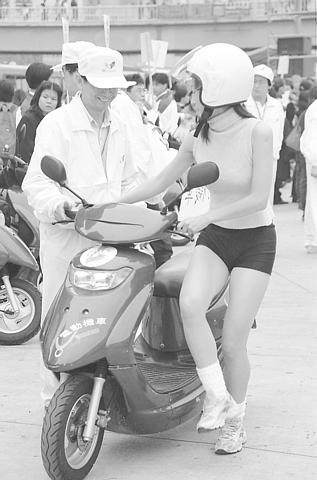The Environmental Protection Administration (EPA) has imposed a quota on manufacturers for the sale of electric scooters, to promote the use of these more environmentally-friendly vehicles. The quota became effective yesterday.
EPA officials said sales of electric scooters would have to account for at least 2 percent of total sales for scooter manufacturers.
"Zero emission and noise-free electric scooters will enhance the air quality in cities," EPA administrator Tsai Hsun-hsiung (

PHOTO: GEORGE TSORNG, TAIPEI TIMES
"As of the end of last year, about 10,000 riders were using electric scooters. We hope for an additional 40,000 riders this year."
"About 20,000 rechargers will also be produced by scooter manufacturers this year, with EPA financial assistance, making things more convenient for riders," Tsai said.
To introduce people to the new vehicle, hundreds of electric scooter riders from 25 counties and cities on the island paraded through downtown Taipei yesterday.
EPA officials said electric scooters, with a top speed of 60km/hr, were suitable for urban commuters. The scooters have a range of about 40km when fully charged.
However, scientists are worried that price will be a problem for would-be buyers. According to the EPA, the regular price for electric scooters is between NT$35,000 and NT$60,000, which is higher than similar models running on gasoline.
Jou Jwo-huei (周卓輝), a professor of material science at National Tsing Hua University, told the Taipei Times the aim of research on electric scooters was reducing weight and lowering prices.
"To popularize electric scooters, establishing a trial area is necessary to illustrate its advantages. These include lower maintenance costs, better air quality and less noise," Jou said. He said that a location such as the Hsinchu Science-based Industrial Park (科學工業園區管理局) was a good example.
According to officials at the Hsinchu park, 1.2 percent of riders in the park had chosen electric scooters. The administration is preparing more parking areas to promote their use.
"We believe the electric scooter is a product which combines high technology with environmental protection. About 20 percent of parking space in the park will be equipped with rechargers by the end of April," said Hsu Ju-hsun
However, while the EPA is trying its best to promote electric scooters in Taiwan, electric cars have been criticized in advanced countries for their cost and poor performance compared with conventional cars.
A Science article in 1995 suggested that electric vehicle technology had the advantage of producing no air pollution at the point of use, but switched the location of environmental damage to areas where battery factories were located.
The authors of the report, Lester Lave, Chris Hendrickson and Francis McMichael from Carnegie Mellon University in the US, focused on the environmental consequences of producing and reprocessing large quantities of batteries to power electric cars.
"Even with incremental improvements in lead-acid battery technology and tighter controls on smelters and lead reprocessors, producing and recycling these batteries would discharge large quantities of lead into the environment," the authors wrote.

GAINING STEAM: The scheme initially failed to gather much attention, with only 188 cards issued in its first year, but gained popularity amid the COVID-19 pandemic Applications for the Employment Gold Card have increased in the past few years, with the card having been issued to a total of 13,191 people from 101 countries since its introduction in 2018, the National Development Council (NDC) said yesterday. Those who have received the card have included celebrities, such as former NBA star Dwight Howard and Australian-South Korean cheerleader Dahye Lee, the NDC said. The four-in-one Employment Gold Card combines a work permit, resident visa, Alien Resident Certificate (ARC) and re-entry permit. It was first introduced in February 2018 through the Act Governing Recruitment and Employment of Foreign Professionals (外國專業人才延攬及雇用法),

RESILIENCE: Deepening bilateral cooperation would extend the peace sustained over the 45 years since the Taiwan Relations Act, Greene said Taiwan-US relations are built on deep economic ties and shared values, American Institute in Taiwan (AIT) Director Raymond Greene said yesterday, adding that strengthening supply chain security in critical industries, enhancing societal resilience through cooperation and deepening partnerships are key to ensuring peace and stability for Taiwan in the years ahead. Greene made the remarks at the National Security Youth Forum, organized by National Taiwan University’s National Security and Strategy Studies Institution in Taipei. In his address in Mandarin Chinese, Greene said the Taiwan-US relationship is built on deep economic ties and shared interests, and grows stronger through the enduring friendship between

CAUTION URGED: Xiaohongshu and Douyin — the Chinese version of TikTok — are tools the Chinese government uses for its ‘united front’ propaganda, the MAC said Mainland Affairs Council (MAC) Minister Chiu Chui-cheng (邱垂正) yesterday urged people who use Chinese social media platforms to be cautious of being influenced by Beijing’s “united front” propaganda and undermining Taiwan’s sovereignty. Chiu made the remarks in response to queries about Chinese academic Zhang Weiwei (張維為) saying that as young Taiwanese are fond of interacting on Chinese app Xiaohongshu (小紅書, known as RedNote in English), “after unification with China, it would be easier to govern Taiwan than Hong Kong.” Zhang is professor of international relations at Shanghai’s Fudan University and director of its China Institute. When giving a speech at China’s Wuhan

ENHANCE DETERRENCE: Taiwan has to display ‘fierce resolve’ to defend itself for China to understand that the costs of war outweigh potential gains, Koo said Taiwan’s armed forces must reach a high level of combat readiness by 2027 to effectively deter a potential Chinese invasion, Minister of National Defense Wellington Koo (顧立雄) said in an interview with the Chinese-language Liberty Times (sister newspaper of the Taipei Times) published yesterday. His comments came three days after US Secretary of State Marco Rubio told the US Senate that deterring a Chinese attack on Taiwan requires making a conflict “cost more than what it’s worth.” Rubio made the remarks in response to a question about US policy on Taiwan’s defense from Republican Senator John Cornyn, who said that Chinese